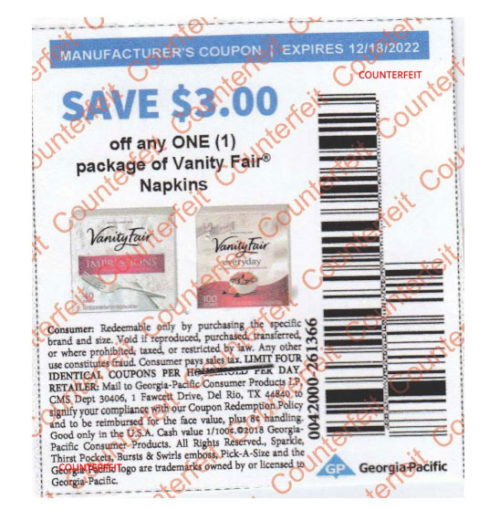Steve Weisman is a lawyer, college professor, author, and one of the country’s leading experts in cybersecurity, identity theft, and scams. See Steve’s other Con Watch articles.
The holiday shopping season is well underway and many people are looking for coupons to cut costs. Like many things in our lives, coupons, which used to be commonly found in newspapers and magazines, have migrated online.
Unfortunately, social media has become a hotbed for phony online coupons. The counterfeit coupons look quite legitimate; it’s very easy to copy a company logo and make a fake coupon appear to be genuine.

The way that many coupon scams work is that in order to qualify for the coupon, you are required to complete a survey in which you must provide a lot of personal information. This information is then used by the scammer to make you a victim of identity theft.
In other versions, you are asked to provide your credit card number. Or you may be required to buy costly items in order to claim your “free” coupon.
Many of the coupon scams also require you to forward the coupon to friends, which make these phony coupons look more legitimate because they come from a trusted source.
Finally, some coupon scammers sell their counterfeit coupons, often by joining coupon forums. There, willing victims purchase the fake coupons, believing the coupon value is significantly higher than the purchase price.
Ultimately, in all of these scams, the coupons are worthless.
Phony coupons are big business for scammers. In 2021 Lori Ann Talens and her husband Pacifico Talens Jr. were convicted of operating a massive counterfeit coupon fraud scheme in which they sold bogus coupons through social media as well as online coupon enthusiast groups. Lori Ann Talens was sentenced to 12 years in prison and her husband was sentenced to seven years.
How do you protect yourself from phony coupon scams?
As always, the first rule is that if the coupon appears too good to be true, it usually is a scam. Many fraudulent coupons purport to be worth $75 or more. No company could afford to give away vast numbers of coupons at that value. (Sometimes, participants in legitimate surveys are promised a chance — and I must emphasize, merely a chance — to win a significant prize in a drawing.)
The FBI advises people to never pay for a coupon and never download a coupon from Internet forums.
One way to determine if a coupon is legitimate is to look for the expiration date found on most coupons. Many — although not all — fake coupons do not carry an expiration date.
The best way to determine if a coupon is legitimate is to go to the website of the particular company purporting to be offering the coupon and see what’s really available. Any genuine coupon that you may encounter online will also be on the real company’s website.
Finally, the Coupon Information Corporation is a non-profit association of manufacturers dedicated to fighting coupon fraud. Their site lists many of the phony coupons presently circulating.
Become a Saturday Evening Post member and enjoy unlimited access. Subscribe now



